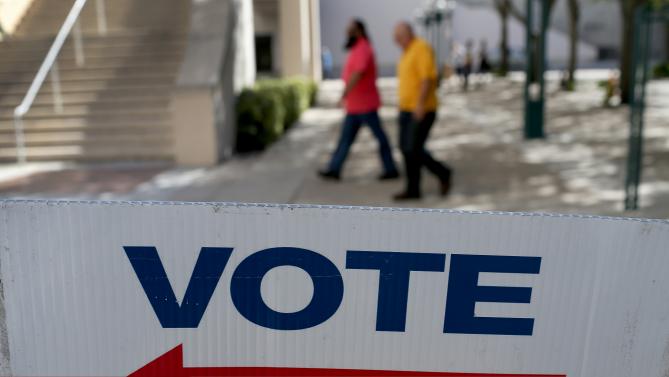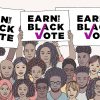
But the real challenge is proving it—all there in one accessible place, all by the numbers. As we reach the 50th-anniversary mark of Selma, Ala.’s “Bloody Sunday”—the indisputable tipping point that got the Voting Rights Act of 1965 passed—the debate continues to rage over how that law has performed and whether we still need it.
The Joint Center for Political and Economic Studies attempts just that with the release of its aptly titled new report, “50 Years of the Voting Rights Act: The State of Race in Politics” (pdf). It’s a compelling, one-stop shop of stats to help you toil through conversations with clueless white people about “post-racial” America.
Since we’re all Selma-nostalgic right now, why not start with the good news: The Voting Rights Act worked. Black-voter registration is way up, by 25 percent, since 1965. Black-voter participation rates in 2012 actually surpassed those of whites. And the number of black elected officials has increased by 1,000 percent since 1965 to nearly 11,000 politicians, combined, on the local, state and federal levels.
We’ve heard the anecdotal horror stories of segregation and the Jim Crow South from our parents and grandparents. Yet, when quantified, the raw political numbers are gripping. They show a desperate no-win situation for black folks before 1965: Black-voter registration rates in the South were barely hitting 20 percent in 1950 because of state-sanctioned racist violence and repression. In Dallas County, Ala.—where Selma was the capital—only 156 out of the 15,000 black citizens eligible to vote were registered.
Enter the Voting Rights Act, and 50 years later we have 46 black members of Congress and nearly 700 black state legislators, according to the Joint Center report, and one black man serving his second term in the White House. The VRA, as it’s abbreviated, did so well that it somehow became a victim of its own success: Convinced that “nearly 50 years later things have changed dramatically,” a conservative Supreme Court ripped the VRA apart (pdf) in a fateful 2013 ruling.
That brings us to the bad news. For every three big steps we took forward over the past 50 years—registration, turnout and getting elected—the Joint Center snapshot shows four alarming steps backward.
The number of minority elected officials is way up, but the proportion is nowhere near our current share of the total U.S. population. Rates of black-voter registration have eclipsed white rates, but now we’re faced with repressive voter-suppressionlaws spreading like a plague through politically red states with large populations of color. Black people have reached voting-participation parity with whites, but our voting patterns, party preferences and candidate selections are all divided and defined by race—more so than by education, age or income. And while black politicians remain active in the political arena, black people are still the biggest policy losers compared with every other demographic group that government responds to.
We instinctively know that we aren’t post-racial—but just in case we don’t believe that, our politics are happy to show us. Putting aside police shootings, Oscar snubs and emailed black-president jokes, it’s the politics that really matter. With three full generations of the Voting Rights Act under our belt, it’s still race that determines our elections and infects our political process.
When voters make electoral decisions, race trumps all of these categories: income, education, political ideology, party affiliation, sexual orientation, age and gender.
“We are actually becoming more divided,” says report co-author and University of California, San Diego, political scientist Zoltan Hajnal. “It’s still an American democracy largely run by whites. And when we as a nation vote, a majority of whites vote very differently from a majority of blacks and other people of color.”
It’s been the trend for a while now. In 2012 nearly 60 percent of white voters supported the Republican presidential nominee and actively pitted themselves against the 93 percent of blacks, 73 percent of Asians and 71 percent of Latinos who voted for President Barack Obama, the Democratic incumbent.
That wasn’t the first time. Years of racially polarized voting have become as dangerous as the red- vs. blue-state recipe that pundits love to talk about. But when white political interests are constantly battling the political interests of people of color, the consequences create severe problems for democracy. Even when 40 percent of the population is nonwhite, only 17 percent of the Congress is, according to a Pew Center report. The Joint Center report delves deeper into that, finding that while African Americans are 12.5 percent of the voting-age population, we’re only 10 percent of the U.S. House and 2 percent of the U.S. Senate. The numbers are even smaller on the local and state levels.
Rampant underrepresentation creates a devastating domino effect: Diminished representation in Congress, state legislatures and city halls ultimately leads to fewer, smaller policy gains. Black issues get dumped on the policy backburner or outright rejected. Eventually the tragedies start piling up: A quarter of the black middle class wiped out. Black poverty almost double the national average. Ferguson, Mo.; Staten Island, N.Y.; Cleveland; Los Angeles. The list grows. That was the exact reason for the Voting Rights Act 50 years ago—and it’s the same reason, 50 years later, that Congress should be having an urgent conversation about how to bring it back.
It’s not as if we didn’t know or feel it already; it’s just hard to paint the picture when confronted with the reigning conventional wisdom of racial progress. Sure, things feel good when you can ride around without sitting in the back of the bus or being forced to drink from “colored” water fountains. But as the Joint Center report’s authors suggest, all is not well with modern democracy. Keeping the Voting Rights Act around could be one of the few remedies we have.
Charles D. Ellison is a veteran political strategist and regular contributor to The Root. He is also Washington correspondent for the Philadelphia Tribune, chief political correspondent for Uptown magazine, Sunday Washington insider for WDAS-FM in Philadelphia and a panelist on MSNBC’s Hardball With Chris Matthews. Follow him on Twitter.















